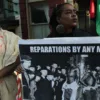
If California Gov. Gavin Newsom is searching for a reparations agenda that has broad appeal, he will need to expand what the movement is all about and focus on policy reforms that would improve the lives of Black Californians as well as people of various races.
The United States Supreme Court recently created two openings by blocking President Joe Biden’s move to waive the federal student debt of 40 million potential voters and banning affirmative action at both private and public universities. Focusing on reforms that address inequities and avoiding the third rail of financial reparations is the sweet spot if the governor seeks to do anything with a California task force’s report that was finished earlier this month.
Advancing nothing would be a disservice to the nine-member California Task Force to Study and Develop Reparation Proposals for African Americans. Its exhaustive and pioneering 40-chapter report truly represents a milestone in the movement. Those who participated, and celebrated its completion last month, sensed that.
“This will be the most impactful thing I have done and been a part of,” said Monica Montgomery Steppe, an attorney and San Diego City Councilwoman. “I know the work is not yet done.”
Amos C. Brown, a long-time civil rights leader who studied under Martin Luther King Jr., started his remarks with the racist past of California’s first governor, Peter Burnett, and ended in a thunderous conclusion.
”We are going to look back, we are going to read, we are going to make sure that our descendants will be able to consult this great document and see the evidence that this state has committed the crime against Black folks and it is time for them to pay their crime bill,” said the 82-year-old Brown. “I am going to stay in this struggle until God calls me home.”
State Sen. Steven Bradford, D-Gardena, a task force member himself, talked about how the nation’s past prevented the development of generational wealth to benefit African Americans of the present and the inequity that has created.
“If you can inherit generational wealth, you can inherit generational debt,” he said. “Reparations are not a gift. It is not a handout. It is not charity. It was what was promised, what was owed and what is long overdue.”
As I have written before, as a white man, I have struggled with some of the suggestions of this task force. Heartfelt anger from some can be off-putting words to others. What matters is our shared future. That future is undoubtedly better if we repair some wrongs along the way. That is where the Supreme Court comes in.
That the United States has 40 million adults with federal student debt is a staggering number. Consider if these debt-burdened Americans happened to vote in the next presidential election with their pocketbook, they represent about half the votes needed for a candidate to get to the White House.
Many may not think of canceling student debt as a form of reparations, but for millions who can’t rely on generational wealth to balance their checkbook for one reason or another, it most certainly is.
The Reparations Task Force made meticulous calculations if California chose a path of financial reparations for the medical and sentencing disparities that have faced African Americans. It is these financial calculations I have struggled with the most, as they were tabulated right down to the dollar. Given how state budget realities are trending in a difficult direction, the whole idea faces stiff financial and political headwinds.
But this same report also proposes policy reforms that would address inequities facing many races:
• Health care reform that expands coverage and eliminates disparities in dental care.
• Sentencing reform that allows citizens the right to vote after they have served a sentence.
• Law enforcement reform that mandates policies and training on bias-free policing.
• Housing reform that provides funds to community-based organizations to expand home ownership.
• Education reform that requires that all curricula at all levels be inclusive and free of bias.
All these policy proposals are part of California reparations as advanced by this task force. All are squarely in an agenda with broad appeal and at the core of our democracy and the constitutional goal to strive to improve our country.
Gavin Newsom has extraordinary communication skills, combined with a rather annoying and uncanny ability to generate attention. He can reshape the reparations movement, if he so chooses, into one that is a unifying force for good.
Tom Philp is a Sacramento Bee columnist. ©2023 The Sacramento Bee. Distributed by Tribune Content Agency.


